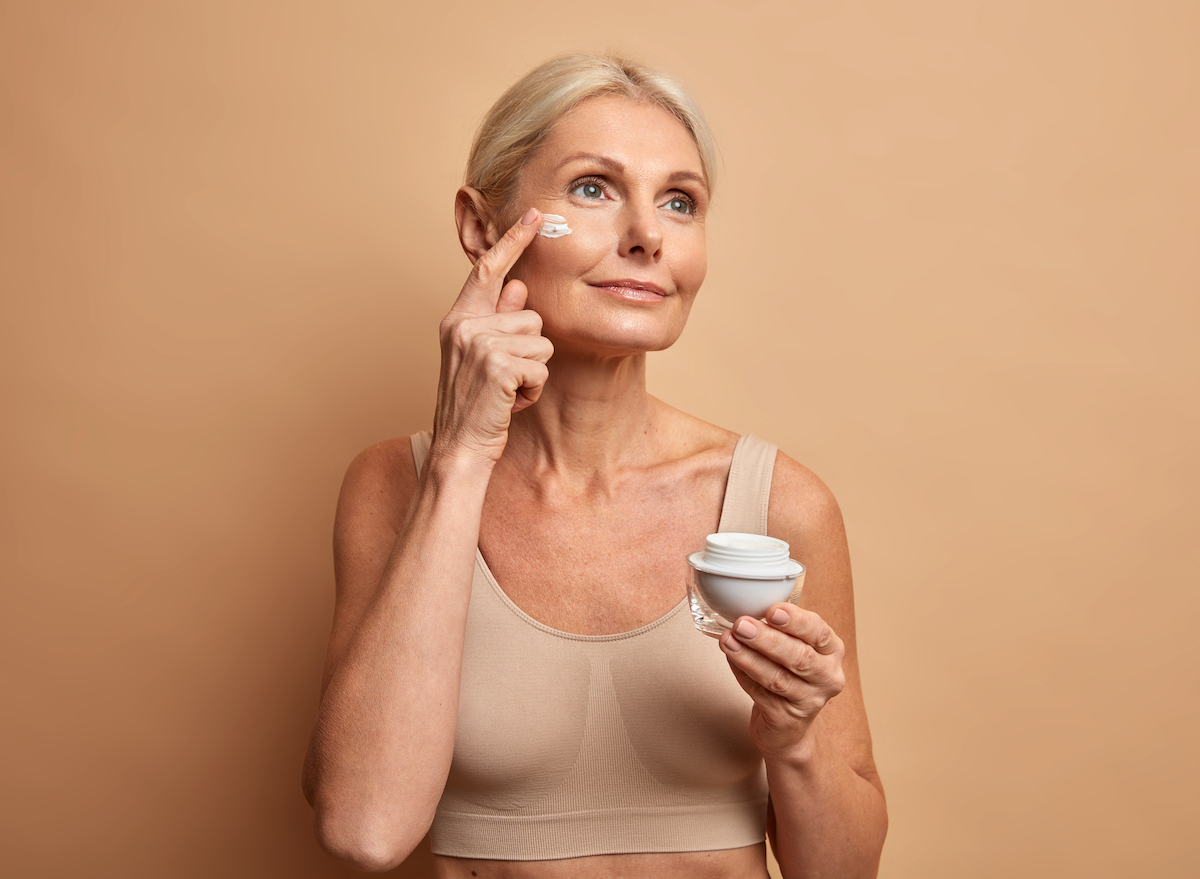Saggy, Crepey Skin? Here Are the 7 Best Ways to Target It

Saggy skin is a natural factor of life that pretty much everyone may have to deal with at one point or another. However, you can help keep your outer layer smooth and supple with a few expert-approved tricks. If you’re dealing with saggy, crepey skin, we have the absolute best ways to target it, thanks to Dr. Alpana Mohta MD, MBBS, DNB, a dermatologist with Better Goods.
Dr. Mohta tells Eat This, Not That!, “It is important to note that genetics, hormonal changes, and other factors can also contribute to saggy skin. These tips can help to improve the appearance of [saggy, crepey skin.]” So keep reading to learn more about them, and next up, don’t miss The 3 Most Effective Face Yoga Exercises To Get Rid Of Wrinkles.
Use skincare products that have collagen and elastin-boosting ingredients.

While you may do your absolute best to choose the right skincare products that keep your exterior clean, moisturized, and glowing, Dr. Mohta says you can also include items in your skincare routine that can help prevent saggy skin. In order to do so, she suggests, “Use skincare products that contain collagen and elastin-boosting ingredients. Collagen and elastin are proteins that help to keep the skin firm and elastic.”
Beyond that, Dr. Mohta explains that skincare products with ingredients like vitamin C, vitamin E, retinol, and alpha hydroxy acids (AHAs) can help with elastin and collagen production and improve how your skin looks.
Exercise regularly.
You might think of working out as a great way to get into great shape and stay as healthy as possible—which it absolutely is. At the same time, exercising regularly can be incredibly beneficial to your skin.
“Regular physical activity can help to tone and firm the skin by building muscle underneath,” Dr. Mohta tells us. However, in order to see the kind of results you’re looking for, aim for a minimum of 150 minutes of moderately intense exercise or 75 minutes of vigorous exercise every week, as recommended by the Centers for Disease Control and Prevention (CDC).
Eat a healthy, well-balanced diet.

“A diet rich in fruits, vegetables, and protein can help to support healthy skin and overall health,” Dr. Mohta says. Granted, there are specific foods you can consume regularly for a skin-nourishing menu that are chock-full of antioxidants, such as berries, nuts, seeds, dark leafy veggies, and dark chocolate.
“Antioxidants help to protect the skin from damage caused by free radicals,” Dr. Mohta explains. “By neutralizing these free radicals, antioxidants can help to slow the sagging and preserve the elasticity and firmness of the skin.”
Now that you know what you should eat, it’s important to know what you shouldn’t eat. According to Dr. Mohta, you should stay away from processed foods and foods that are high in sugar, as they can lead to inflammation and the breakdown of elastin and collagen in your skin.
Get enough sleep.
Making sure you get a good night’s sleep may not always be easy. However, it’s important for your overall health and wellness. In fact, not getting sufficient Z’s can lead to serious issues such as high blood pressure, heart disease, stroke, and diabetes, according to the CDC.
The health of your skin also depends on getting a solid night’s sleep. Dr. Mohta points out, “Adequate sleep is important for overall health and can help to improve the appearance of the skin.” WebMD explains that new collagen is produced in the skin while you’re sleeping, and this collagen keeps your skin tight.
Dr. Mohta recommends aiming for seven to nine hours of solid sleep each night.
Avoid smoking and excessive alcohol consumption.

If you’re trying to stay healthy, you likely know that smoking cigarettes and excessive alcohol consumption can be detrimental and even fatal. According to Cancer Treatment Centers of America, alcohol and tobacco can heighten your risk of developing several kinds of cancer.
So it should come as no surprise that smoking and over-drinking can hurt your skin. Dr. Mohta points out, “Smoking and excessive alcohol consumption can contribute to premature aging of the skin and the breakdown of collagen and elastin. Limiting these behaviors can help to maintain the health and appearance of the skin.”
Use sunscreen every day.
“Sun exposure can cause damage to the skin and contribute to the breakdown of collagen and elastin,” Dr. Mohta explains. “[Wearing] sunscreen with a high SPF on a daily basis can help to protect the skin and reduce the risk of saggy skin.”
To make sure you’re using the right kind of sunscreen, the American Academy of Dermatology Association has some suggestions. Be sure to opt for a sunscreen that is water-resistant, SPF 30 or higher, and is meant to protect you from both UVA and UVB rays. That way you can still enjoy sunny days without having to worry about your skin.
Stay hydrated.
Staying properly hydrated is chock-full of health benefits. According to the Harvard T.H. Chan School of Public Health, getting your fill of water can help you ward off infections, boost your mood, keep your body temperature in check, and promote better sleep.
On top of all that goodness, Dr. Mohta explains, “Drinking enough water can help to keep the skin hydrated and plump, which can help to reduce the appearance of saggy skin.” You should aim to consume a minimum of eight ounces of water each day, according to Dr. Mohta. Although, if you’re exercising or it’s a hot day, you may need more.








